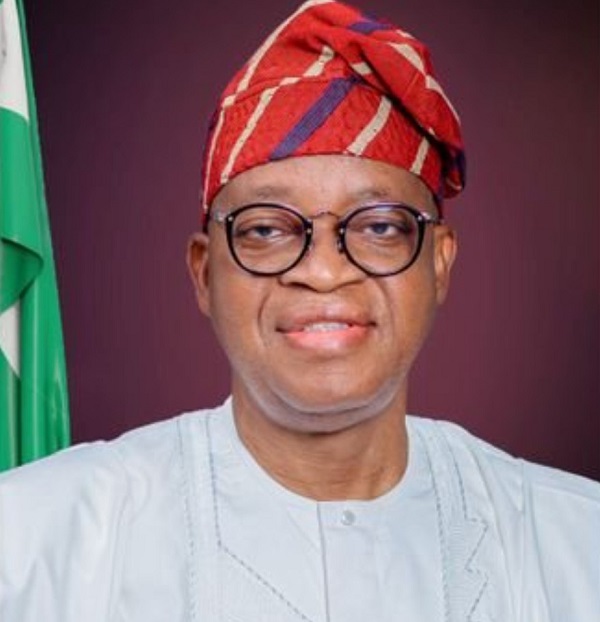Adegboyega Oyetola, Minister of Marine and Blue Economy
The Minister of Marine and Blue Economy, Adegboyega Oyetola, has said that the ministry recorded an income of N242 billion in the first quarter of 2024.
Speaking in Abuja on Tuesday during the ministerial sectoral update to mark President Bola Tinubu’s first year in office, the minister said the revenue generated represents a 92 percent increase from the N126 billion recorded in Q1 2023.
A breakdown indicated that the Nigerian Ports Authority, NPA, grew its revenue from N82.98 billion in the first quarter of 2023 to N170.49 billion in the first quarter of 2024. Similarly, the Nigerian Maritime Administration and Safety Agency, NIMASA’s revenue rose from N37.4 billion in the first quarter of 2023 to N62.15 billion in the first quarter of 2024.
The Nigerian Shippers Council, NSC, recorded N4,878,647,275 in the first quarter of 2023 and N8,675,726,271 in the first quarter of 2024. Lastly, the National Inland Waterways Authority, NIWA, recorded 1,087,157,340 in the first quarter of 2023 and 1,488,588,802 in the first quarter of 2024.
He noted that the ministry, created by President Tinubu, aims to tap into Nigeria’s 853 kilometres of coastline and an expansive maritime area of 46,000 square kilometres. This initiative is strategically designed to maximise the country’s ocean resources while promoting sustainable economic growth.
Oyetola emphasised that this milestone is significant for the newly established ministry created to harness Nigeria’s vast marine resources and diversify the national economy.
He said the impressive revenue increase is attributed to several strategic measures implemented by the ministry. These include a 10 percent rise in the number of vessels calling at Nigerian ports, resulting from significant investments in port infrastructure. Enhanced security measures, improved port facilities, and technological advancements in revenue collection all played a crucial role.
He noted that the ministry aims to tap into Nigeria’s 853 kilometres of coastline and an expansive maritime area of 46,000 square kilometres. This initiative is strategically designed to maximise the country’s ocean resources while promoting sustainable economic growth.
Oyetola added that the ministry’s efforts have also focused on resolving long-standing issues such as congestion and illegal checkpoints on port access roads. For instance, the Tin-Can Island Port corridor, notorious for traffic gridlock, has significantly improved, saving billions of naira annually.
Additionally, he stated that the completion of key projects likes the Funtua Dry Port and the rehabilitation of access roads in major ports has been instrumental. Collaboration with the Federal Ministry of Works has led to the repair of crucial port roads, further enhancing port efficiency and economic growth.
He said: “The ministry’s forward-thinking approach includes promoting inland dry ports to de-congest seaports and reduce transportation costs. The Funtua Dry Port, commissioned in May 2024, is set to ease business operations and boost trade.
“Fisheries and aquaculture also form a core part of the ministry’s agenda. An agreement with Delta Systematics Group aims to position Nigeria as a leader in fish production. The transition of the Department of Fisheries to the Ministry of Marine and Blue Economy is expected to significantly boost fishery outputs and create jobs.
“Future plans include the deployment of advanced monitoring systems to combat illegal fishing, enhancing artisanal fisheries, and developing policies to support sustainable fisheries. Engagements with international bodies and private sector investments are underway to further expand the sector.”
According to Oyetola, the ministry’s achievements extend to port operational efficiency, with initiatives to automate processes, reduce bureaucratic bottlenecks, and enhance revenue transparency. The implementation of a Port Community System and procurement of port scanners are among the steps taken to streamline operations.
Oyetola emphasised that maritime security has also been prioritised, with the deployment of armoured patrol boats and advanced surveillance systems ensuring safety in Nigeria’s waters. These measures have resulted in a notable reduction in piracy and maritime terrorism.
“As the Ministry of Marine and Blue Economy celebrates its first year, its achievements underscore the potential of Nigeria’s blue economy to transform the nation’s economic landscape. The comprehensive policy framework, set to be finalised by December 2024, promises to further solidify Nigeria’s position as a premier maritime nation. This impressive revenue growth is not just a testament to the ministry’s strategic initiatives but also a harbinger of the transformative impact the blue economy can have on Nigeria’s future,” he said.


Comment here